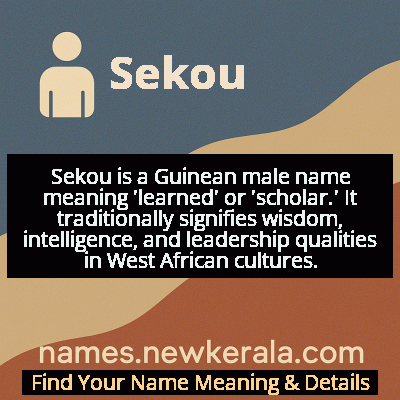Sekou Name Meaning & Details
Origin, Popularity, Numerology Analysis & Name Meaning of Sekou
Discover the origin, meaning, and cultural significance of the name SEKOU. Delve into its historical roots and explore the lasting impact it has had on communities and traditions.
Name
Sekou
Gender
Male
Origin
African
Lucky Number
8
Meaning of the Name - Sekou
Sekou is a Guinean male name meaning 'learned' or 'scholar.' It traditionally signifies wisdom, intelligence, and leadership qualities in West African cultures.
Sekou - Complete Numerology Analysis
Your Numerology Number
Based on Pythagorean Numerology System
Ruling Planet
Saturn
Positive Nature
Ambitious, efficient, realistic, and authoritative.
Negative Traits
Materialistic, stressed, confrontational, and can be overly ambitious.
Lucky Colours
Dark blue, black.
Lucky Days
Saturday.
Lucky Stones
Blue sapphire, amethyst.
Harmony Numbers
2, 4, 6.
Best Suited Professions
Business leaders, managers, financial services, law enforcement.
What People Like About You
Leadership, determination, organizational skills.
Famous People Named Sekou
Sékou Touré
Political Leader
First President of Guinea who led the country to independence from France in 1958
Sékouba Bambino
Musician
Renowned Guinean vocalist and former lead singer of Bembeya Jazz National
Sékou Camara
Soccer Player
Professional footballer who played for the Guinea national team and various European clubs
Sékou Kaba
Athlete
Canadian Olympic hurdler representing Guinea in international competitions
Name Variations & International Equivalents
Click on blue names to explore their detailed meanings. Gray names with will be available soon.
Cultural & Historical Significance
In Guinea specifically, the name carries special weight due to Sékou Touré, the nation's first president who famously told French President Charles de Gaulle 'We prefer poverty in liberty to riches in slavery.' This historical moment cemented Sekou as a name associated with dignity, independence, and African self-determination. Throughout the region, families traditionally give this name to boys expected to demonstrate wisdom, leadership, and intellectual capabilities, often destined for roles as community leaders, scholars, or religious figures. The name embodies the high value placed on education and wisdom in many West African societies, where learned individuals command significant respect and influence within their communities.
Extended Personality Analysis
Individuals named Sekou are typically perceived as intellectually gifted, wise beyond their years, and possessing natural leadership qualities. From childhood, they often display a curiosity and analytical mindset that sets them apart, approaching problems with methodical precision rather than impulsive reactions. Their calm, thoughtful demeanor frequently makes them the voice of reason in chaotic situations, and they tend to earn respect through demonstrated competence rather than demanding it. The name carries cultural expectations of responsibility and maturity, with Sekous frequently being looked to for guidance and decision-making in both family and community settings.
These individuals tend to be deeply principled, valuing knowledge and education highly, and often pursue paths that allow them to mentor others or contribute to their communities through their expertise. While they may appear reserved initially, Sekous typically form deep, meaningful relationships built on mutual respect and intellectual connection. Their natural authority is typically tempered by humility and a genuine desire to serve others, making them respected rather than merely authoritative figures. Many bearers of this name feel a sense of responsibility to live up to its meaning, driving them toward continuous self-improvement and meaningful contributions to society.
Modern Usage & Popularity
In contemporary times, Sekou remains a popular and respected name throughout West Africa and among diaspora communities worldwide. While maintaining its traditional gravitas, the name has adapted to modern contexts, with bearers excelling in diverse fields including technology, academia, business, and arts rather than being confined to traditional scholarly or religious roles. The name continues to be particularly common in Guinea, where it honors national heritage and independence legacy, but has also gained international recognition through successful individuals in sports, music, and politics. Recent naming trends show steady usage rather than dramatic popularity spikes, indicating the name's enduring appeal as a classic choice that conveys intelligence, cultural pride, and leadership potential without being overly common or trendy. Among African diaspora communities in Europe and North America, Sekou serves as a meaningful connection to cultural roots while remaining accessible in global contexts.
Symbolic & Spiritual Meanings
Symbolically, Sekou represents the bridge between traditional wisdom and modern knowledge, embodying the ideal of the lifelong learner who respects heritage while embracing progress. The name carries connotations of intellectual light cutting through ignorance, much like a scholar illuminating dark corners of understanding for the benefit of all. It symbolizes the responsibility that comes with knowledge—the obligation to guide, teach, and improve one's community rather than hoarding expertise for personal gain. Metaphorically, Sekou suggests a deep-rooted tree of wisdom whose branches provide shade and shelter to others, representing stability, growth, and nurturing leadership that strengthens over time. The name also symbolizes cultural continuity, connecting contemporary bearers to centuries of Islamic scholarship and West African intellectual traditions while remaining relevant in modern global contexts where wisdom and ethical leadership are increasingly valued.

